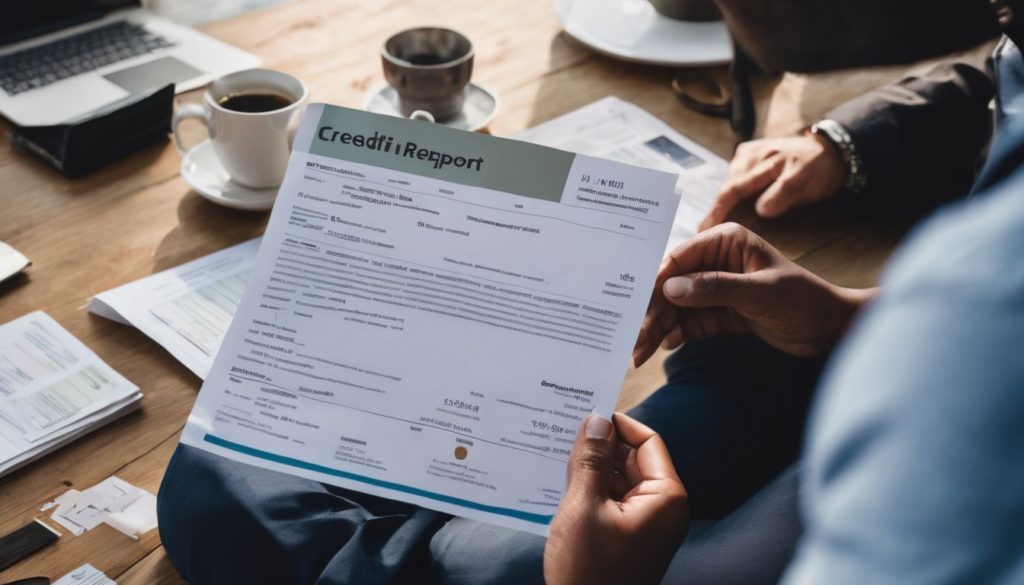
Many consumers wonder if Affirm, a popular “buy now, pay later” service, can help boost their credit scores. While Affirm reports to credit bureaus like Experian and TransUnion, the impact on your credit might be different than expected.
This article will clearly explain how using Affirm could affect your score and alternative ways to improve it more effectively. Ready to delve into the world of point-of-sale financing? Let’s get started!
Key Takeaways
- Affirm, a popular “buy now, pay later” service, can help build credit scores by reporting payment history to credit bureaus.
- Late or missed payments with Affirm can negatively impact your credit score and result in late fees.
- Before choosing Affirm for credit building, consider factors such as reporting to credit bureaus, interest rates and fees, and approval requirements.
- Alternative credit-building options include personal loans, credit cards, and other point-of-sale financing options.
Understanding Point-of-Sale Financing

Point-of-sale financing, also known as buy now pay later or point-of-sale loans, is a popular payment method allowing consumers to make purchases and split the cost into equal payments or smaller installments.
Definition and popularity
Point-of-sale financing, often known as ‘buy now, pay later‘, is gaining immense popularity due to its convenience and immediacy. This method allows consumers to finance purchases instantly at the checkout point, enabling them to buy more expensive items without immediate financial burden.
Redefining traditional shopping experiences, companies like Affirm have skyrocketed in demand over recent years. Consumers appreciate Affirm’s transparent policies with no hidden fees or surprises, contributing significantly to their growing reach across different markets.
How Point-of-Sale Loans Can Impact Your Credit Score

Point-of-sale loans can significantly impact your credit score, especially if you make late or missed payments or default on the loans. Understanding these potential pitfalls is crucial for anyone considering using Affirm for credit building.
Read more about the factors to consider before choosing this financing option and alternative credit-building options.
Late or missed payments
Late or missed payments can have a severe negative impact on your credit score. Choosing the Affirm payment method and failing to make timely payments will likely tarnish your credit history.
The severity increases significantly with each more late fee or missed installment in your payment plan, due every two weeks. This bad habit could affect your future ability to get approved for more financing and result in hefty late fees.
It’s crucial to understand that maintaining a consistent record of on-time payments is essential for building a solid credit profile.
Defaulting on loans
Defaulting on loans is a situation that heavily impacts your credit score. This happens when you fail to make scheduled payments over a certain period one time. Financial institutions then perceive you as a high-risk borrower, causing them to increase interest rates or deny future loan applications altogether.
With Affirm’s buy now pay later method, a missed payment or payments may result in late fees but will often not affect your credit score as traditional lenders do. However, it’s always crucial to stay disciplined with due dates regardless of the lending platform used for preserving and improving one’s credit history.
Factors to Consider Before Choosing Affirm for Credit Building
Before using Affirm to build credit, it is important to understand factors such as reporting to credit bureaus, interest rates and fees, and approval requirements. Read on to find out more.
Reporting to credit bureaus
Affirm reports your payment history to credit bureaus, which can impact your credit score. This means that if you make your payments on time and in full, it can help build a positive credit history.
However, if you miss payments or pay late, it could negatively affect your credit score. It’s important to note that each bureau may have a different reporting timeline late payment amount, so it’s crucial to stay consistent with your payments to see the desired results.
By responsibly using Affirm and making timely payments, you can potentially improve your creditworthiness over time.
Interest rates and fees
Affirm offers point-of-sale financing with clear and transparent interest rates and fees. Before choosing Affirm as a credit-building option, it’s essential to understand these factors.
Interest rates can vary depending on your creditworthiness and the loan term length. It’s important to review the terms carefully and ensure you can comfortably afford the interest rate and monthly payments, considering any additional fees that may apply.
By being aware of these costs upfront in person purchases, you can make an informed decision about using Affirm to build your credit score without any surprises along the way.
Approval requirements
To get approved for an Affirm loan, there are certain requirements you need to meet. First, Affirm performs a soft credit check when you apply, which doesn’t impact your credit score.
However, they may also perform a hard credit inquiry in some cases. Additionally, Affirm requires that you have a U.S. residential address and be at least 18 years old (19 in Alabama).
While they don’t disclose their minimum credit score requirement, having a good credit history will increase your chances of approval. Finally, it’s important to note that meeting the approval requirements does not guarantee you’ll be approved for an Affirm loan.
Alternative Credit Building Options
Other credit-building options include personal loans, credit cards, and other point-of-sale financing options.
Personal loans
Personal loans can be a viable option for building credit. Here are some ways they can help:
- Fixed repayment schedule: With a personal loan, you have a set repayment schedule requiring regular monthly payments. This consistent payment history can positively impact your credit score.
- Diverse credit mix: Adding a personal loan to your credit portfolio diversifies the types of credit you have, which can also boost your credit score.
- Potential for larger loan amounts: Personal loans typically offer higher borrowing limits than other forms of credit, such as credit cards or point-of-sale financing options.
- Longer repayment terms: Personal loans often come with longer repayment terms, making it easier to manage and budget for monthly payments.
- Lower interest rates: Depending on your creditworthiness, personal loans may offer lower interest rates than other borrowing forms, which can save you money in the long run.
- Opportunity for consolidation: If you have multiple debts or high-interest loans, consolidating them into one personal loan could simplify your repayments and save on interest charges.
- Credit builder programs: Some lenders offer specialized personal loans designed specifically for building or improving credit scores. These programs may have certain requirements or restrictions but can be helpful if you’re looking to establish or rebuild your credit history.
- Accessible funds: Once approved for a personal loan, the funds are usually deposited directly into your bank account, giving you immediate access to the money you need.
Credit cards
Credit cards can be a useful tool for building your credit score. Here are some points to consider when using credit cards for credit building:
- Make sure to make your monthly payments on time and in full.
- Keep your credit card balances below 30% of your available credit limit.
- Avoid opening too many new credit card accounts simultaneously, which may lower your average account age.
- Regularly check your credit reports from the three major credit bureaus (Experian, TransUnion, and Equifax) to ensure accuracy.
- Consider applying for a secured credit card if you have limited or poor credit history.
Other point-of-sale financing options
Other point-of-sale financing options include personal loans, credit cards, and buy-now-pay-later services. Personal loans are a common option for financing larger purchases and can help build credit when paid on time. When used responsibly and with timely payments, credit cards can also positively impact your credit score. Buy-now-pay-later services like Afterpay and Klarna offer installment payment plans without interest or fees if you make all payments on time. These alternatives provide additional payment options and for consumers looking to build their credit history while purchasing.
Conclusion
Using Affirm can potentially help in building credit scores. By making on-time payments and managing your Affirm account responsibly, you can establish a positive payment history, which is an important factor in determining creditworthiness.
However, it’s crucial to consider other credit-building options, such as personal loans and credit cards before choosing Affirm as the best fit for your financial goals. Remember always to make informed decisions regarding building and maintaining good credit.
FAQs
1. What is Affirm, and does it help build credit?
Affirm is a point-of-sale BNPL service that offers no installment payments for loans on in-person and online purchases, which can boost your credit scores if you make timely payments.
2. How does using Affirm affect my credit score?
Your payment history with Affirm, including on-time payments and any late payments or outstanding payments, all gets recorded in your Experian credit report, affecting your financial health positively or negatively.
3. Can I use Affirm for any purchase?
You can use Affirm to make small online orders to larger in-person buys. The loan terms are usually 12 months but may span longer than 30 days depending on the purchase price.
4. Does affirm charge interest like traditional Credit Card companies?
Not always! While some Affirm loans have an APR of up to 30%, others offer zero-interest four equal payment plans that pay monthly or over six weeks called ‘Split Pay’ – although late fees apply.
5. How do payments work with Affirm loans?
When you make a purchase using an Affirm account, you typically provide a down payment via debit card right at the point-of-sale, then pay off the three remaining four equal payments in installments monthly as per agreed loan terms – thus improving how much credit you are given overall through positive repayment behavior.
6. Apart from financing purchases, are there other services offered by Affirms?
Yes! Customers also have access to savings accounts and advanced features such as upcoming monthly payment reminders managed via excellent customer service provided by this financial platform.









Leave a Reply